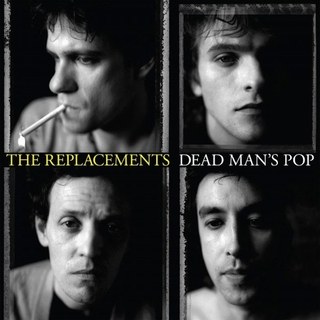The Replacements were never going to be the biggest band in the world, not U2- or R.E.M.-sized, anyway. They had their sizable fan contingent, but retained a cult/college/modern rock corner. Therefore, 1989’s Don’t Tell A Soul was not likely to increase that cadre, but instead split the present faithful.

Okay, so that’s not exactly the case. I became a fan of the ‘Mats through that album, but I feel I was already susceptible. All I needed was a whiff to convince me, and I’m happy to say that the album made me a lifelong convert. (A short life, though, since their next record, All Shook Down (1990) would be the last official full-length.) The point is that half of the fan base would appreciate Don’t Tell A Soul as a terrific rock record, the other half would shout “sell-out” and reject it, and the world would keep on turning.
It wasn’t Let It Be. It wasn’t Hootenanny or even Tim, but for me, it was perfect.
With the release of Dead Man’s Pop, a reimagining of the album without excessive overdubs or extra reverb, tied to an altered running order, perfection would be tested. This edition is more in line with the original intentions of the band and producer Matt Wallace, not the “three-dimensional, radio-ready sound” from mixer Chris Lord-Alge. I’ll get into Alge’s work momentarily, but before I do that, let’s get one thing out of the way. I don’t see this as a corrective to the original, but instead as a rawer, more immediate edition of it. For us diehard fans of Don’t Tell A Soul, there was nothing wrong with it.
That said, Dead Man’s Pop is fascinating. Even with the studio gloss sheared back, the songs are still there, still reminding you of how terrific a lyricist Paul Westerberg could be. Tommy Stinson, Chris Mars, and new addition Slim Dunlap were undeniably on fire with the potential of rock, and twice as convincing when they turned it way down.
While the majority of the tracks suffer not a whit from the remix, I was shocked by the drastic change to “We’ll Inherit The Earth.” The intro is completely gone, as are some “rowdy” overdubs. It’s not improved, simply different. It sounds closer to how it did when performed live, so keep that in mind when you listen to it.
The new song running order is disorienting to the regulars, and this to me really is the improvement. The ending alone provides a constructive clarity that the original edition did not. If it was decided between Westerberg and Wallace that “Rock ‘N’ Roll Ghost” should close out the record, then that should have held. It is a natural conclusion to an album detailing misfits, feeling like misfits, seeing small wins around the corner, but in true misfit style not being able to seize them, and finally, facing that mirror and realizing that more than a decade into pursuing overnight success, you’re just not the band you used to be. Alcohol was close by Westerberg, and that would ultimately hobble the group.
The collection is suitably tricked-out: a second disc features b-sides, alternate recordings, and a clutch of tracks recorded with Tom Waits. A concert from June 1989 in Milwaukee fills out the last two CDs and reminds all that The ‘Mats were at home on the stage. They were never going to bust out the same way as U2 or R.E.M. did because, for them, the studio was a means to an end, not the end itself. Songs from the show rage and roar where their studio counterparts were measured. Finally, there’s a 12-inch vinyl LP of the Matt Wallace mix and an oversized book with an essay by Bob Mehr.
Look, if you are going to accuse me of being biased, I’m guilty as charged. Someone walks up to me and asks where to start in The Replacements’ canon, I will send them to the $8 Don’t Tell A Soul before I send them to the $60+ Dead Man’s Pop. Chris Lord-Alge may have been Sire Records’ hedge against losses, and maybe he leaned a bit too heavily on some tricks that worked well for others, but he and Wallace’s final product is far from failure.
In someone’s fevered dream, it can be imagined that the un-retouched Wallace mix would have lit the fuse early on the “real” revolution of rock that the ’90s exemplified. In that state, Don’t Tell A Soul would have beaten Nirvana’s Nevermind and Pearl Jam’s Ten to the punch. That did not happen, and not coincidentally, both bands chafed at the shiny sound of those discs, with the latter engaging Brendan O’Brien to do a full remix after the fact. No, it wasn’t going to be Don’t Tell A Soul that reset everything, even though in true rock and roll fashion, the band was blowing themselves up to get there.
As a curio, you can’t do better than this, though. Dead Man’s Pop reminds me of why I fell so hard for this bunch so long ago. It’s a big ol’ treat for fans, and maybe this time, thanks to the attractive forces of nostalgia, it will pull in some new converts too. It is not essential, but for us, it’s a wonderful “might-have-been.”